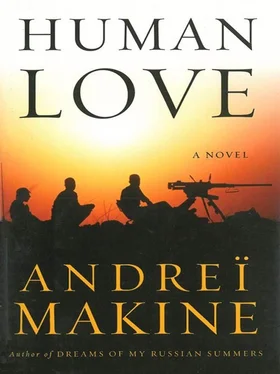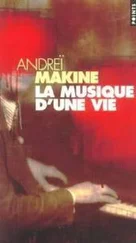He wanted to talk to him about his mother in the prison at Dondo. An invisible woman, impossible to make out amid the throng of prisoners. And then, snatched away from that human mass, a mute shadow lying there in their shack on the banks of the Cuanza. And beneath her ashen skin, the white gleam of the broken collarbone. He would talk, too, about Anibal, the priest whose god calmly accepted it all, this broken collarbone, a prisoners body covered in wounds crawling with insects, and the death of this woman who, a few days earlier, had held all the happiness in the world in the crook of her arm…
He broke away from his fathers embrace and stammered: “You know. Mothers… dead. And when she was -” “Yes, yes, they told me,” his father hastened to reply and walked over to straighten a map that hung on the wall. “Yes, I heard… Yes. That’s…” Elias was expecting, “That’s terrible,” but his father gave a cough and concluded, with a sigh, “That’s how it is.”
At that moment a woman came into the room. Tall and thin. A white woman. “Let me introduce you,” said his father. “Elias. Jacqueline.” She had colorless eyes, a somewhat lined, angular face, and wore a military garb of the same slightly theatrical cut as his father’s uniform. Listening to her, Elias learned she was Belgian, a militant anticolo-nialist and internationalist (she emphasized her commitment insistently in almost every sentence). All this was doubtless very important, but strangely, Elias was mainly thinking about the woman’s long body, which his father doubtless held in his arms at night. He felt a sad satisfaction now at not having spoken about his mother, about her broken collarbone.
“He doesn’t look too bright, your boy. I’ll have to give him a bit of a jolt. Wake his ideas up…” Jacqueline said it in French, so as not to be understood; his father nodded agreement, with a complicit smile. Elias replied in French, looking her straight in the eye: “Don’t waste your time, Madame. The Portuguese have already performed that thankless task.” The arrival of another white person rescued the adults from their confusion. Elias had time to notice that the map on the wall was of New Zealand. He never discovered why.
Elias took an immediate liking to the man who had just walked in, perhaps because he came as close as possible to an adolescent’s image of a revolutionary A face lit by a hidden fire, brisk, firm gestures, words capable of causing his listeners’ chests to swell. And that prophetic gaze, faintly squinting eyes that seemed to see beyond the disappointing present, beyond this scattering of huts among the trees, beyond the laundry gently rippling on a line. He was dark, with the long, gleaming hair of a painter, and as he smoked he released long, curling, bluish strands, very different from those emitted by the others; it was his signature in the air. Elias came under his spell, as everyone did. The soldiers called him “Commandante;” his father and Jacqueline, Ernesto. After five minutes of conversation he turned to Elias and proclaimed in inspired, solemn, almost prophetic tones: “Elias, you will come with us, to Havana. You will study there. You will learn the science of Revolution!” Was it the resonant impact of the Spanish or the ringing tones of the promise? It carried such conviction that, as if hypnotized, Elias pictured a town beside the sea and a double of Ernesto instructing him in revolution. The Cuban was a kind of sorcerer, a wizard with words, Elias would think later. He left the room, drugged with hope.
***
This narcotic effect overwhelmed the whole of that little revolutionary base and lasted for two days, until Ernesto’s departure. The warriors who only the previous day had been wandering around aimlessly or sleeping marched about as if on parade, took part in tactical exercises, river crossings… Even the expressions on their faces changed. In this remote corner of the tropical rain forest, Ernesto gave them a glimpse of a radiant path, a horizon to aim for. The speech he delivered spoke of just this horizon, a world of liberty, of plenty, of happiness. To reach it they must take the road of armed struggle, proletarian solidarity… Did they all understand this? Elias was not sure that they did, but he sensed it was more a matter of magic than of logic. Like the language of sorcerers, he thought, no one understands it, but no one is immune to it. “The triumph of our struggle will sound the death knell for the forces of imperialism… Your children will live in a world without poverty, without exploitation.” The music of these words blended with the shades of night, with the glittering of the first stars. Ernesto’s face, lit by the firelight, seemed to reflect the shining future he could already discern in the depths of the forest.
That night Elias noticed a light burning in the hut that served as command post. An oil lamp, Ernesto’s head bowed over a notepad, a pen quivering in his hand. Every now and then the man raised his head and smiled, peering for a long time into the darkness. With all the enthusiasm of youth, Elias felt he was living through a moment that belonged to history.
The next day Elias came upon a soldier who was preparing to play his part In history: half recumbent, his back propped up against the hot wall of a hut, he was rubbing away energetically at a smooth black object. It was an amulet, yes, a lucky charm, he explained, vaguely at first; then, flattered by the boys interest, he was more specific: “I wear it here, next to my heart. That side says if I shoot, I kill my enemy This side says, if he shoots, the bullets bounce off me. IVe already tried it.” He was buffing his gri-gri with something that gave off a greasy, fleshy stink. “So that s leather, is it?” asked Elias. The soldier suddenly flew into a rage and thrust him aside, abusing him. “You shall never know!” he shouted. “Or else you will die! Never!” And walked off into the forest without pausing in his polishing.
Returning to the camp, Elias came upon a conversation In a dark spot between the younger woman cook and a soldier he had seen before, the one who had been haranguing a crowd of ghosts in a drugged state. Now he was talking very softly, very fast, all the while attempting to thrust a bundle of cloth into the young woman’s hands. This was a very fine dress, he assured her, trimmed with lace and glass beads. It was clear to Elias that they had already reached the final round of the negotiations: the cook was no longer saying no, the soldier was talking with the excitement of someone who is certain his bid will succeed. Before going to sleep Elias thought about this couple, who were now engaged in making love. The man was very fat; his belly spilled out over his belt. One had to imagine this swollen, sweating mass pressing down on the young woman’s very slender body. Elias experienced a violent constriction in his lungs. Jealousy, desire, no doubt, pity, but most of all incomprehension: this piece of fabric with its glass bead trimmings, this coupling, and then nothing, a void, life continuing as before, just as dull, just as stupid. He made an effort to salvage the residue of love in this encounter between a fat body and a slim one. Then he remembered the movements made by the feet of lovers in the sexual act. Tensing, scratching, relaxing. If only he could ask Ernesto: “Could your struggle one day awaken something other than that in human hearts?”
Two days later he managed to join his father, whose travels across the country he was now to share. “Its no good waiting passively for the revolutionary situation to arise,” Ernesto declared, addressing the rebels. “You have to provoke it. Yes. By force of arms!” Elias thought he had heard this terminology somewhere before. But most of all what these words silenced in him was the only question he longed to ask: “After the revolution, do you think people will love one another in a different way?”
Читать дальше









